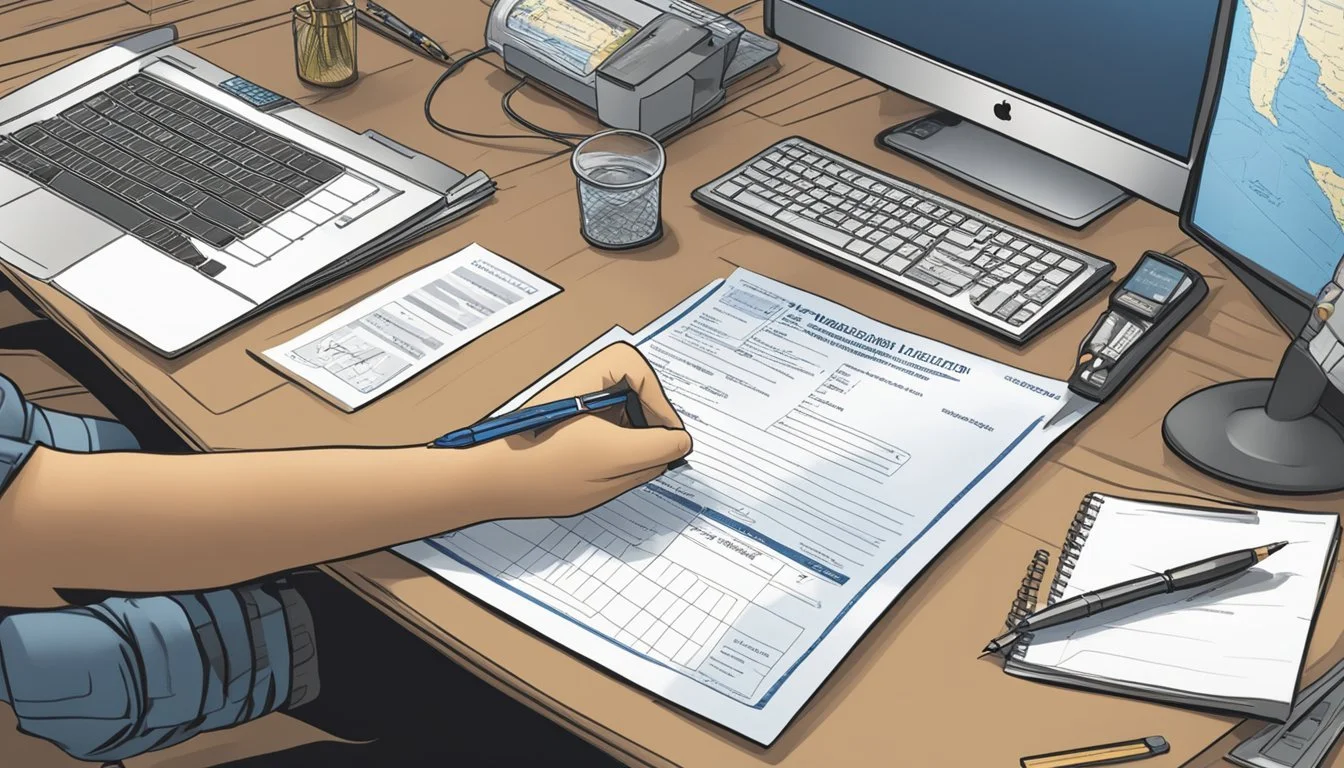How to Get a Rhode Island Freshwater Fishing License
Your Essential Guide
Acquiring a freshwater fishing license is a mandatory step for individuals 15 years of age and older who wish to engage in the cherished pastime of fishing in Rhode Island's streams, rivers, and ponds. The state offers a diverse range of freshwater fishing experiences, with species including largemouth and smallmouth bass, trout, and northern pike, among others. As such, the license serves as a gateway to exploring these aquatic resources responsibly, while also contributing to their conservation and management.
The licensing process in Rhode Island is designed with accessibility in mind. Enthusiasts can obtain a fishing license through various channels: online platforms provide an efficient and convenient option, while local bait and tackle shops, retail department stores, and certain city and town clerk offices offer more personal interactions for those who prefer it. The license is not only a legal requirement but also plays a crucial part in maintaining the ecological balance and funding wildlife and conservation programs.
Fishing licenses in Rhode Island are valid from March 1st through the last day of February each year. Fees for these licenses have seen adjustments, which can be reviewed in the state's factsheet on recent fee changes. It is also noteworthy that Rhode Island has reciprocal license agreements with neighboring Connecticut and Massachusetts for specific water bodies, broadening the scope of fishing opportunities for anglers. This reflects a commitment to providing a comprehensive and accessible fishing experience while fostering cross-state collaboration for environmental stewardship.
Understanding Rhode Island Fishing Licenses
Rhode Island requires fishing licenses to regulate freshwater fishing, promote conservation, and support the management of local fish populations. These licenses are mandatory for individuals aged 15 and over, with special provisions for various groups.
Types of Fishing Licenses
In Rhode Island, there are several types of fishing licenses available:
Annual Freshwater Fishing License: For residents and non-residents to fish in freshwater bodies.
3-Day Tourist Freshwater Fishing License: A short-term option for non-resident anglers.
Combination Licenses: These cover both freshwater fishing and hunting.
Residents who are blind, those with 100% disability, or minors under the age of 15 may be eligible for free or discounted licenses. Veterans and members of the armed forces may qualify for special licensing terms.
Benefits of Obtaining a License
By obtaining a fishing license in Rhode Island, anglers contribute to:
Conservation efforts: Funds from license sales support habitat protection and enhancement, fish stocking, and research.
Legal fishing: A license ensures compliance with state regulations, preventing fines and protecting resources.
Special Licenses and Stamps
Certain fish species, such as trout, may require additional endorsements:
Trout Conservation Stamp: Necessary for anyone wishing to catch and keep trout or to fish in a catch-and-release or 'fly-fishing only' area.
These stamps and special licenses provide funding specifically for trout stocking and management efforts, ensuring the sustainability of this valuable species. Special licenses and provisions exist for groups such as veterans and those who have a 100% disability rating.
Eligibility and Requirements
Rhode Island offers a variety of freshwater fishing licenses catering to both residents and non-residents. A license is a legal requirement for those 15 years of age or older who want to engage in fishing activities in the state's freshwater bodies.
Age and Residency Requirements
Residents and non-residents alike must be at least 15 years old to apply for a Rhode Island freshwater fishing license. Individuals under the age of 15 can enjoy fishing without the need for a license.
Residents are defined as individuals who have established a principal place of residence in Rhode Island.
Non-residents include tourists and other visitors who do not meet the residency qualifications.
Special Eligibility for Landowners
Landowners who own property that encompasses a body of freshwater may be eligible for special licensing provisions. This typically applies to RI residents who are:
Domiciled within Rhode Island.
The legal owners of the freshwater body or have fishing rights.
Determining Resident Versus Non-Resident Status
The distinction between resident and non-resident status hinges on where individuals are domiciled and their intent to make Rhode Island their permanent place of residency.
Residents must have lived in Rhode Island for at least six consecutive months before applying for a fishing license.
Non-residents, including non-resident tourists, are those visiting or living in Rhode Island for a short-term period without the intent to establish domicile.
How to Purchase a Freshwater Fishing License
Securing a freshwater fishing license in Rhode Island is straightforward, whether one opts for the convenience of an online application or the traditional in-person method. Proper documentation is necessary to complete the licensing process.
Online Application Process
Applicants can obtain a Rhode Island freshwater fishing license through the Rhode Island Department of Environmental Management (RIDEM) website. The online process requires the applicant to:
Navigate to the official RIDEM licensing web page.
Follow the prompts to enter their personal details, such as name and address.
Verify their identity by uploading appropriate documentation.
Select the type of license.
Make a payment via Visa, Mastercard, Discover, or their debit card.
Upon successful application and payment, the applicant will receive a confirmation, and their fishing license can be printed at home.
In-Person Purchase Options
For those preferring or requiring an in-person transaction, licenses can be purchased at:
Authorized agents, including bait and tackle shops and retail department stores.
Select city and town clerk offices.
The DEM Office of Boating Registration and Licenses.
Applicants should be prepared to provide the same personal details and documentation as required for the online process.
Required Documentation for Licensing
To purchase a fishing license, every applicant must present valid identification. This includes:
A current driver's license for residents.
Military identification if they are active-duty military stationed in Rhode Island.
A foreign national might need to show a passport and current visa.
It's important to have these documents on hand before beginning the application process, whether online or in person, to ensure a smooth transaction.
Understanding Fishing Regulations and Conservation
In Rhode Island, freshwater fishing is governed by a set of regulations designed to balance recreational opportunity with conservation of natural resources. These rules are set forth to ensure sustainable fisheries for future generations.
Regulations for Freshwater Fishing
The Rhode Island Department of Environmental Management (DEM) oversees the enforcement of fishing regulations. All anglers over the age of 15 must obtain a freshwater fishing license to fish in any freshwater stream or pond within the state. Specific waters that are stocked with trout close periodically to prepare for the traditional opening day, which is scheduled on the second Saturday in April each year.
Creel and Possession Limits: It is essential for fishers to adhere to the established daily creel limits, which dictate the number of fish they can catch and keep in one day. These limits vary by species and can change annually, so consulting the latest freshwater fishing abstract provided by the DEM is critical.
Conservation Efforts in Rhode Island
Conservation stamps, such as the Trout Conservation Stamp, are required for anglers who wish to keep or possess trout, domestic salmon, (What wine goes well with salmon?) or charr, or who fish in designated catch-and-release or fly-fishing-only areas. The revenue generated from these stamps supports trout and salmon stocking programs, habitat development, and conservation efforts throughout the state.
Conservation Requirement Details Trout Conservation Stamp Required for keeping trout/salmon Catch-and-Release Areas Stamp needed for fishing Fly Fishing Only Areas Stamp needed for fishing
Protected Species and Creel Limits
To support biodiversity and maintain healthy fish populations, Rhode Island has identified protected species and set forth specific creel limits for different fish species.
Trout: The possession limit for trout is set to safeguard the populations, including specific size requirements.
Salmon and Charr: Similar regulations are in place for domestic salmon and charr, aligning with conservation goals.
For the most current regulations, anglers should refer to the Rhode Island Freshwater Fishing Abstract or visit the DEM's official website. By understanding and complying with these regulations, fishers contribute to the state's conservation efforts and help protect Rhode Island's precious freshwater ecosystems for years to come.
Frequently Asked Questions
Who needs a Rhode Island freshwater fishing license? Individuals aged 15 years and older must obtain a license to fish in any freshwater bodies within Rhode Island.
What are the requirements for obtaining a license? Applicants should provide proof of residency and age. A government-issued ID is typically required.
How much does the license cost?
Resident: $18
Non-Resident: $35
Tourist (3-day): $16
Where can I purchase a fishing license? Licenses can be acquired online at Rhode Island's Department of Environmental Management website or through authorized license agents.
Is there a reciprocity agreement with neighboring states? Yes. There is reciprocity with Connecticut for Beach Pond, Killingly Pond, Hazard Pond, and Peck Pond, and with Massachusetts for Wallum Lake.
How can I renew my fishing license and when? Licenses can be renewed annually online or through any license agents prior to expiration.
Are there any exemptions to requiring a fishing license? Landowners and their family members are exempt when fishing on their own property.
What if I lost my fishing license? A duplicate can be obtained for a nominal fee through the same channels as the original purchase.
Please note that all information is subject to change, and individuals should verify details with the latest regulations and updates from the Rhode Island Department of Environmental Management.
Additional Resources
For those seeking to obtain a Rhode Island freshwater fishing license, the Rhode Island Department of Environmental Management (DEM) provides several resources. These resources ensure that anglers can easily find necessary information, purchase licenses, and take advantage of special fishing opportunities.
Contact Information for RI DEM
Rhode Island Department of Environmental Management offers direct assistance with fishing licenses. Interested parties can reach out to them at:
Address: DEM Office of Boating Registration and Licenses, 235 Promenade St., Providence, RI
Website: rio.ri.gov
RIHFID Support: RIHFID numbers, crucial for identifying your fishing license records, are managed by RI DEM and support can be accessed through their contact channels.
List of Authorized Sales Agents
Licenses can also be purchased through authorized sales agents including:
Bait and tackle shops
Retail department stores
Select city and town clerk offices
It is advisable to check the latest list on the DEM website or at rio.ri.gov for an updated roster of agents.
Information on Free Fishing Days
The Department of Environmental Management hosts Free Fishing Days annually, allowing residents and non-residents to fish without a license. Specific dates can be found on the DEM's website or by contacting DEM directly. These days provide an excellent opportunity for newcomers to experience fishing in Rhode Island's freshwater environments.
Where to Fish in Rhode Island
Rhode Island offers a variety of freshwater fishing spots, from serene ponds to flowing rivers, suited for anglers in search of diverse species. These spots are scattered across the state, ranging from public access waterways to more regulated private ones.
Top Freshwater Fishing Locations
Ponds:
Beach Pond: A shared resource with Connecticut, offering excellent fishing opportunities for bass and northern pike.
Hazard Pond: Noted for its peaceful fishing environment.
Olney Pond: Located in Lincoln Woods State Park, this pond is ideal for families and novice anglers.
Killingly Pond: Provides a quiet retreat for local anglers.
Peck Pond: Known for its tranquility and accessible fishing spots.
Lakes and Streams:
Wallum Lake: A border water with Massachusetts, Wallum Lake is popular for its variety of fish species.
Freshwater streams and smaller lakes throughout Rhode Island also offer extensive fishing opportunities for species such as trout, panfish, and bass.
Navigating Public versus Private Waterways
When fishing in Rhode Island, it's crucial to distinguish between public and private waterways. Public waterways are accessible to all, often without the need for special permissions beyond the required fishing license. State parks and public recreation areas typically house these waterways, providing a hassle-free experience for anglers. In contrast, private waterways may require additional permissions from landowners or private entities, and it is important for fishermen to respect these designations to maintain the integrity of the sport and the local ecosystem.
Notably, certain waters might have reciprocity with neighboring states, allowing anglers to fish in shared waters with a valid Rhode Island fishing license. For example, a Rhode Island license is reciprocally recognized for Beach Pond, Killingly Pond, Hazard Pond, and Peck Pond with Connecticut, and Wallum Lake with Massachusetts, but it's advisable to check the specific regulations before planning a fishing trip.








